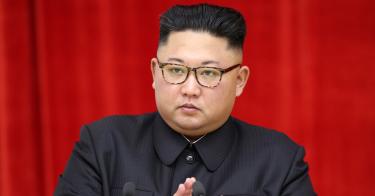Last week, South Korean President Moon Jae-in delivered a verbal message from Kim Jong-un to Pope Francis inviting him to travel to North Korea. The Pope indicated an interest in meeting with North Korea’s dictator, if he received a formal, written invitation.
Even if the invitation were embossed in gold, a papal visit would be ill-advised. It would doubtless be construed as an unwarranted détente between the Vatican and one of the world’s worst persecutors of persons of faith.
Pope Francis has shown keen interest in Asia. Kim Jong-un’s invitation came on the heels of a provisional Vatican deal with China.
Inked in late September, the Vatican allegedly recognized seven previously excommunicated bishops appointed by the Chinese government. There is still some question as to whether or not the deal grants veto power to the Pope over future bishops selected by the Chinese Communist Party. Such a deal has potentially serious consequences for the religious freedom of Catholics in China. Also worrisome is that the agreement came amidst a severe crackdown on religious freedom in China.
A papal visit to North Korea lends legitimacy to a regime that, according to Open Doors USA, is the world’s worst persecutor of Christians. Like China, North Korea has been labeled a “country of particular concern” in the State Department’s annually released International Religious Freedom report since its inception, and rightly so.
In 2014, the UN Commission of Inquiry report found that North Korea committed crimes against humanity. It went on to note that the “gravity, scale and nature of these violations reveal a state that does not have any parallel in the contemporary world.” Moreover, the report found that Christians face greater persecution than any other religious group in North Korea.
How bad is it? Consider the experience of Ji Hyeon A. The subject of persistent persecution for her Christian faith, Ms. Ji fled to China three times. Each time, she was repatriated by Beijing back to North Korea. On one such occasion, North Korean officials forced her to renounce her Christian faith and abort her unborn baby.
Ms. Ji’s experience is not unique for repatriated North Koreans. The UN Commission of Inquiry reports that they are routinely asked if they had contact with Christian missionaries during their time in China. If the answer is yes, they face far harsher treatment than other repatriated refugees; in some cases, they are even sent to political prison camps. Christians are thought to make up a high percentage of the estimated 80,000 to 120,000 political prisoners in North Korea.
The Vatican may assume that rapprochement with North Korea will have a positive impact on religious freedom for North Koreans, but past experience demonstrates that negotiations with North Korea happen on their own terms. And Kim Jong-un is not interested in improving religious freedom in the country.
The North Korean government sees religion as a threat to its three generations of dynastic rule, which has centered around the pseudo-deification of the North Korean leader. Every North Korean must maintain a spotless, dust-free picture of their so-called Dear Leader on the wall of their home or face punishment. Some of North Korea’s fear of religion stems from the role that religion, especially Catholicism, has played in the overthrow of communist regimes in the former Soviet Union, Poland, and Romania.
The Vatican should instead learn from the failures of the Singapore Summit meeting between Donald Trump and the North Korean leader. That high-profile meeting placed Kim Jong-un in the limelight and yielded little to no progress on stated objectives of denuclearization or improving human rights. A papal meeting with Kim Jong-un would prove equally non-productive.
Indeed, it might prove counter-productive. As Sung-Yoon Lee, assistant professor at the Fletcher School at Tufts University, has noted:
Rather than advance even incrementally peace, denuclearization, and the human rights of the long-suffering people of North Korea, the papal visit would only encourage Kim Jong-un to carry on his reckless policy of nuclear brinkmanship and ruthless policy of extreme repression.
Instead, the Pope should consider issuing several conditions prior to agreeing to a meeting. For example, he could call on Kim to permit humanitarian organizations access to political prison camps that no doubt imprison North Korean Catholics or press for the release of women and children from these camps. Without progress on human rights or in promoting religious freedom, the Pope risks sacrificing leverage needed to advance the cause of freedom in North Korea.
He should say no to a meeting with Pyongyang’s brutal dictator at this time.
This piece originally appeared in Forbes https://www.forbes.com/sites/oliviaenos/2018/10/26/why-the-pope-should-say-no-to-meeting-kim-jong-un/#128de22f7c46



